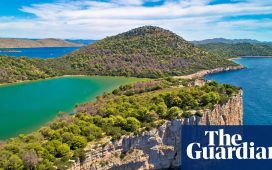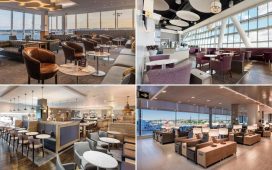HALF-BUILT hotels with dodgy food, lecherous waiters and all that famously cheap booze.
Pale-skinned British tourists frying in the blistering sun — and loving every minute of it.
These are some of the package- holiday images handed down through the generations that still persist today.
But the world has moved on and many of us are now experienced travellers from a young age.
Package holidays, which were the way to travel before the internet made it so easy to book yourself, have survived by going upmarket and expanding to cover even more of the world.
But will they still exist after the coronavirus crisis is over or will most tour operators have gone out of business?
Thomas Cook organised his first trip — by train from Leicester to Loughborough 12 miles away — in 1841.
By 1855 he was running tours to Europe.
These were not package holidays, but escorted tours for wealthy people wanting to experience different cultures — still a big business today.
Travel was mainly by rail and sea until the first commercial flights started, and by 1939 Thomas Cook was selling a week by air to the South of France for £15/5s, around £1,000 in today’s money.
With planes being small and hotels in short supply, foreign travel was only for the wealthy.
And this was true even into the 1950s when package holidays as we know them today got started.
Vladimir Raitz, of Horizon Holidays, was the pioneer.
In 1950 he was the first to charter his own planes for a series of weekly flights.
The destination was Corsica. Previously, getting there usually took 48 hours by train and ferry.
Horizon’s Douglas DC-3 Dakota flights took a mere six hours, including a stop to refuel.
The cost for a week all-in was £32/10s — around £1,100 in today’s money. And this was to a campsite, not a hotel.
Things changed dramatically in the Swinging Sixties.
New jet planes could get you to the Med non-stop in just a couple of hours — and with around 130 seats they brought cheaper prices.
France and Italy had been the main focus in the Fifties, but in the Sixties the next big thing was Spain.
Dictator General Franco saw tourism as a way of lifting the country out of poverty, and hotels were thrown up with little regard for planning and the local population.
The same happened to a lesser extent in Italy, Greece, Portugal, Yugoslavia, Malta and Bulgaria.
By the mid-1960s a package holiday boom (and bust for some) was under way for companies including Clarksons, Horizon, Cosmos, Riviera, Lord Brothers and Skytours.
The Boeing 737 jet became the workhorse of the package-holiday business, with Britannia the leading airline.
When media conglomerate the Thomson Organisation acquired Skytours, Britannia, Riviera and a company called Gaytours in 1965, it brought professionalism and stability.
By the time Sid James, Hattie Jacques, Barbara Windsor and Co reinforced the myths about foreign travel in 1972 film Carry On Abroad, the package holiday was a must for many thousands of people.
Weekends in Majorca or Moscow cost just £29 (equivalent to £380 today) — but some of the “myths” had a basis in fact.
One hotel in Majorca closed after a crack ran down the side, and planeloads of holidaymakers were diverted mid-flight with nowhere to stay.
Tensions between British and German guests became common.
Old-fashioned Thomas Cook was a retail travel agent and escorted tour operator rather than a package holiday company, but many colourful characters emerged.
Clarksons’ Tom Gullick and Intasun’s Harry Goodman became household names as they led the cheap holiday revolution.
“It was cowboy country, like the beginning of a gold rush,” Harry would recall.
The multi-millionaire, who had grown up in poverty in the East End of London, explained that package holidays were driven by two things — where the hotels were cheap and the exchange rate favourable.
When Clarksons went bust in 1974, Thomson Holidays became the top operator and Intasun its cut-price challenger.
When the price controls disappeared, there was huge growth, which continued into the Eighties as names such as Intasun, Horizon and Yugotours got big.
In 1979, Harry Goodman started selling package holidays to Florida from £139 (equivalent to £380 today).
But when his International Leisure Group went bust in 1991, it was the signal for Airtours to grow.
Thomson was still number one, and Thomas Cook bought up some big names to join the fray.
The “big four” was completed by Airtours and First Choice, all with their own travel agency chains.
They came into the new millennium full of confidence — and then it all went wrong.
The 9/11 terrorist attack in the US caused a global slowdown in travel.
This was followed by a rise in internet bookings as people flocked online.
The boss of one big holiday firm admitted that low-cost airlines had not been seen as a threat when they started in the mid-Nineties.
But he added they then “bit us on the backside” as they expanded from city routes to holiday resort routes.
Who needed package holidays now?
The big four became the big two — Thomson and Thomas Cook.
And German towels were thrown on to British sunbeds big time as both were part of international groups based in Germany.
Now there is just the big one — Thomson’s owner TUI — which dropped the Thomson name in 2018.
Low-cost airline Jet2 is now the second-biggest package holiday firm.
But that does not tell the whole story.
There were hundreds of smaller, specialised tour operators making a good living and many online travel agents selling packages until the current crisis.
Long-established names that have survived since at least the Sixties include Kuoni, Inghams, Olympic and Balkan Holidays.
Despite all the change, package holidays still represent good value for money, and you are better protected than with a DIY holiday. Let’s hope they survive.































